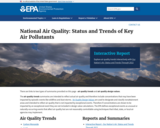
Where does your water come from? Join Ken, a hydrogeologist, and learn all about groundwater. [4:47]
- Subject:
- Science
- Material Type:
- Audio/Video
- Provider:
- Wisconsin Green Schools Network - Environmental Education for Kids
- Date Added:
- 07/01/2022


Where does your water come from? Join Ken, a hydrogeologist, and learn all about groundwater. [4:47]

When Milly Zantow learned about a problem in her Sauk County community, she took action. Learn how she made it possible for us to recycle plastics today. [5:31]

Here you can find an engaging lesson plan on the trash each individual generates over time. Students will learn how trash is generated, how trash is disposed of, and possible ways to reduce the amount of trash.

This site from the Environmental Education for Kids contains colorful and detailed information on water resources. Site covers fascinating tips and facts, as well as engaging quizzes on the wonderful world of water. Best suited for grades 3-6.

The signs of global climate change are becoming more and more evident. The EPA provides an excellent guide for students that acquaints them with the basic causes, effects on people and the environment, and solutions that they can engage in. Here is an informative site that will prepare the student to make a difference.

Use this student portal to understand all you can about acid rain and its harmful effects. Modules for interactive games, stories, puzzles, vocabulary terms and links to other activities and experiments.

How does the air quality in my city compare with other cities? What time of year has the best air quality? Has the air quality in my city improved? AirCompare provides local air quality information to help you make informed, health-protective decisions about moving or vacationing.

Each year EPA tracks the levels of pollutants in the air and how much of each pollutant (or the pollutants that form them) is emitted from various pollution sources. The Agency looks at these numbers year after year to see how the pollutants have changed over time. EPA posts the results of the analyses to this web site.

Find out how plants and animals adapt to changes in ecosystems.

Official site with information and resources relating to all aspects of environmental conservation: data, maps and laws. Specific environmental information by zip code provides immediate relevance to your world.

Provides an overview of the issue of sediment contamination in the Great Lakes, how the problem is assessed, causes of contamination, and remedial efforts. Includes links to more in-depth information.

Explains what is meant by sediments, how they can become contaminated, the types of contaminants, how contamination levels are assessed, and methods of remediation. The side menu links to information about policies, contaminant transport, and other topics. There are also many links throughout the site to PDF files of technical papers, reports, and fact sheets.

Find out about the six major air pollutants. In-depth descriptions of ozone, nitrogen dioxide, particulates, sulfur dioxide, carbon monoxide, and lead are provided.

Retrieve information from multiple sources of Envirofacts' System Data for your area of interest. using zip code, city, or county information.

Using zip codes, this site allows students to locate businesses in their communities that are producing wastes.

Understand the process that must occur to create carbon dioxide. What is the role of carbon dioxide in our atmosphere? A video illustrating the carbon cycle is available.

Earth's atmosphere contains greenhouse gases. Find out what these gases are and where they come from. Also link to other information about how greenhouse gases contribute to climate change.

Explains what hypoxia is, its causes, the sources, why it is important to reduce it, and where it occurs around the world. Includes a diagram showing how hypoxia develops in a water body and links to lots of additional resources.

This site is loaded with information on solid waste and hazardous waste. It includes industries' effects on the environment, waste programs, treatment, control, pollution prevention, recycling, and cleanup programs.

Air pollution occurs both inside and outside and is dangerous to individuals as well as to the planet. The Environmental Protection Agency oversees laws and regulations related to air quality and has gathered a wealth of information to help individuals understand the issue and address air pollution problems.